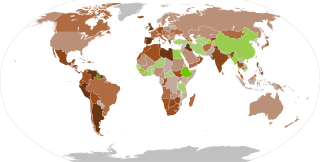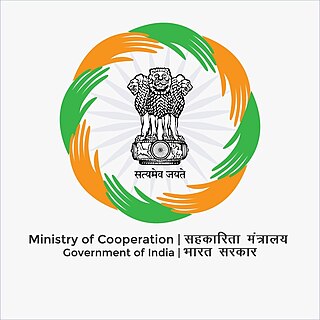
Narendra Damodardas Modi is an Indian politician serving as the current Prime Minister of India since 26 May 2014. Modi was the chief minister of Gujarat from 2001 to 2014 and is the Member of Parliament (MP) for Varanasi. He is a member of the Bharatiya Janata Party (BJP) and of the Rashtriya Swayamsevak Sangh (RSS), a right wing Hindu nationalist paramilitary volunteer organisation. He is the longest-serving prime minister outside the Indian National Congress.

The Union Budget of India, also referred to as the Annual Financial Statement in Article 112 of the Constitution of India. It is the annual budget of the Republic of India set by Ministry of Finance for the following financial year, with the revenues to be gathered by Department of Revenue to identify planned government spending and expected government revenue and the expenditures gathered by Department of Expenditure of the public sector, to forecast economic conditions in compliance with government policy.

The Minister of Finance is the head of the Ministry of Finance of the Government of India. One of the senior most offices of the Union Cabinet, the finance minister is responsible for the fiscal policy of the government. A key duty of the Finance Minister is to present the annual Union Budget in Parliament, detailing the government's plan for taxation and spending in the coming financial year. Through the Budget, the finance minister also outlines allocations to all the ministries and departments. The Minister is assisted by the Minister of State for Finance and the junior Deputy Minister of Finance.

Nirmala Sitharaman is an Indian economist, politician and a senior leader of the Bharatiya Janata Party (BJP) serving as the Minister of Finance and Minister of Corporate Affairs of the Government of India since 2019. She is a member of the Rajya Sabha, the upper house of the Indian Parliament, representing Karnataka since 2016 and previously represented Andhra Pradesh from 2014 to 2016. Sitharaman previously served as the 28th Defence Minister from 2017 to 2019, thereby becoming India's second female defence minister and the second female finance minister after Indira Gandhi, and the first full-time female minister to hold each of those portfolios. She served as junior minister in the Modi ministry between 2014 and 2017, holding successive positions, first for her dual appointment as the Minister of State in the Ministry of Finance and the Minister of State in the Ministry of Corporate Affairs from May to November 2014, and then as the Minister of State for the Ministry of Commerce and Industry from May 2014 to September 2017, before being elevated to senior posts within the Union Cabinet.

Railway budget of India was the Annual Financial Statement of the state-owned Indian Railways, which handles rail transport in India. It was presented every year by the Minister of Railways, representing the Ministry of Railways, in the Parliament.
The Greater Nashik Metro or Metro NEO is a proposed rapid transit system in the Nashik Metropolitan Region. The system is proposed to reduce traffic congestion as well as provide direct connectivity to Nashik city from its suburbs. The Greater Nashik Metro will connect suburbs of Nashik city like Deolali, Nashik Road, Upnagar, Nashik Airport, Sinnar, Igatpuri, Gangapur Road, Trimbakeshwar, Dindori, Bhagur, Niphad, Adgaon, Ghoti Budruk and Girnare.

Parakala Prabhakar is an Indian political economist and social commentator. He served as Communications Advisor in cabinet rank in the Government of Andhra Pradesh from July 2014 to June 2018. For several years, he presented current affairs discussion programme on Telugu television channels, such as Pratidhwani on ETV2 and Namaste Andhra Pradesh on NTV.

National Smart Cities Mission is an urban renewal and retrofitting program by the Government of India with the mission to develop smart cities across the country, making them citizen friendly and sustainable. The Union Ministry of Urban Development is responsible for implementing the mission in collaboration with the state governments of the respective cities. The mission was planned to include 100 cities, with the deadline for completion of the projects set between 2019 and 2023. As of July 2024, 7202 out of total 8018 tendered projects have been completed, utilizing ₹144,530 crores out of total tendered amount of ₹164,163 crore.

The Rafale deal controversy is a political controversy in India related to the purchase of 36 Rafale multirole fighter aircraft for a price estimated at €7.87 billion by the Defence Ministry of India from France's Dassault Aviation. The origin of the deal lies in the Indian MMRCA competition, a multi-billion dollar contract to supply 126 multi-role combat aircraft to the Indian Air Force (IAF) with a transfer of technology.

Har Ghar Jal is a scheme initiated by the Ministry of Jal Shakti of Government of India under Jal Jeevan Mission in 2019 with the aim to provide 55 litres of tap water to every rural household per capita per day regularly on long term basis by 2024. It is a restructuring of National Rural Drinking Water Programme (NRDWP) by Modi government in August 2019.
The 2020 Union Budget of India was presented by the Finance Minister, Nirmala Sitharaman on 1 February 2020, as her second budget. This is the second budget of Narendra Modi-led NDA government's second term. The Economic Survey for 2019–2020 was released on 31 January 2020, a day before the budget. Before the budget speech the report of the 15th Finance Commission was tabled by the Finance Minister.

The economic impact of the COVID-19 pandemic in India has been largely disruptive. India's growth in the fourth quarter of the fiscal year 2020 went down to 3.1% according to the Ministry of Statistics. The Chief Economic Adviser to the Government of India said that this drop is mainly due to the coronavirus pandemic effect on the Indian economy. Notably, India had also been witnessing a pre-pandemic slowdown, and according to the World Bank, the current pandemic has "magnified pre-existing risks to India's economic outlook".

The Pradhan Mantri Matsya Sampada Yojana (PMMSY)(http://pmmsy.dof.gov.in/) is an initiative launched by the Government of India to establish a comprehensive framework and reduce infrastructural gaps in the fisheries sector. The scheme was announced by the Finance Minister, Nirmala Sitharaman during her speech in the parliament of India while presenting the Union budget for 2019–20 on 5 July 2019. The government intends to place India in the first place in Fish production and processing by implementing Neeli Kranti (transl. Blue Revolution). This scheme is in line with governments aim to double the farmers' income by 2022–23.
Atmanirbhar Bharat, which translates to 'self-reliant India', is a phrase the Prime Minister of India Narendra Modi and his government used and popularised in relation to the country's economic development plans. The phrase is an umbrella concept for the Modi government's plans for India to play a larger role in the world economy, and for it to become more efficient, competitive and resilient.
Pradhan Mantri Garib Kalyan Anna Yojana is a food security welfare scheme announced by the Government of India on March 26 2020, during the COVID-19 pandemic in India. The program is operated by the Department of Food and Public Distribution under the Ministry of Consumer Affairs, Food and Public Distribution. But the nodal ministry is Ministry of Finance.The scale of this welfare scheme makes it the largest food security program in the world benefiting 81.35 crore in India.
The 2021 Union Budget of India was presented by the Minister of Finance on 1 February 2021. The budget is the first one to be presented orally due to ongoing COVID pandemic.

The Ministry of Cooperation is a Union ministry under the Government of India which was formed in 2021. The ministry provides a separate administrative, legal and policy framework for strengthening the cooperative movement in the country. The ministry's creation was announced on 6 July 2021 along with its vision statement of Sahkar se samriddhi. Before the creation of this ministry, the objectives of this ministry were looked after by the Ministry of Agriculture.
The 2022 Union Budget of India was presented by the Minister of Finance Nirmala Sitharaman on 1 February 2022, as her fourth budget. This is the third budget of Narendra Modi-led NDA government's second term. The Economic Survey for 2021–2022 was released on 31 January 2022, a day before the budget.
The 2024 Union Budget of India was presented by Finance Minister, Nirmala Sitharaman on 23 July 2024. This was the first budget of Narendra Modi led NDA government's third term.












